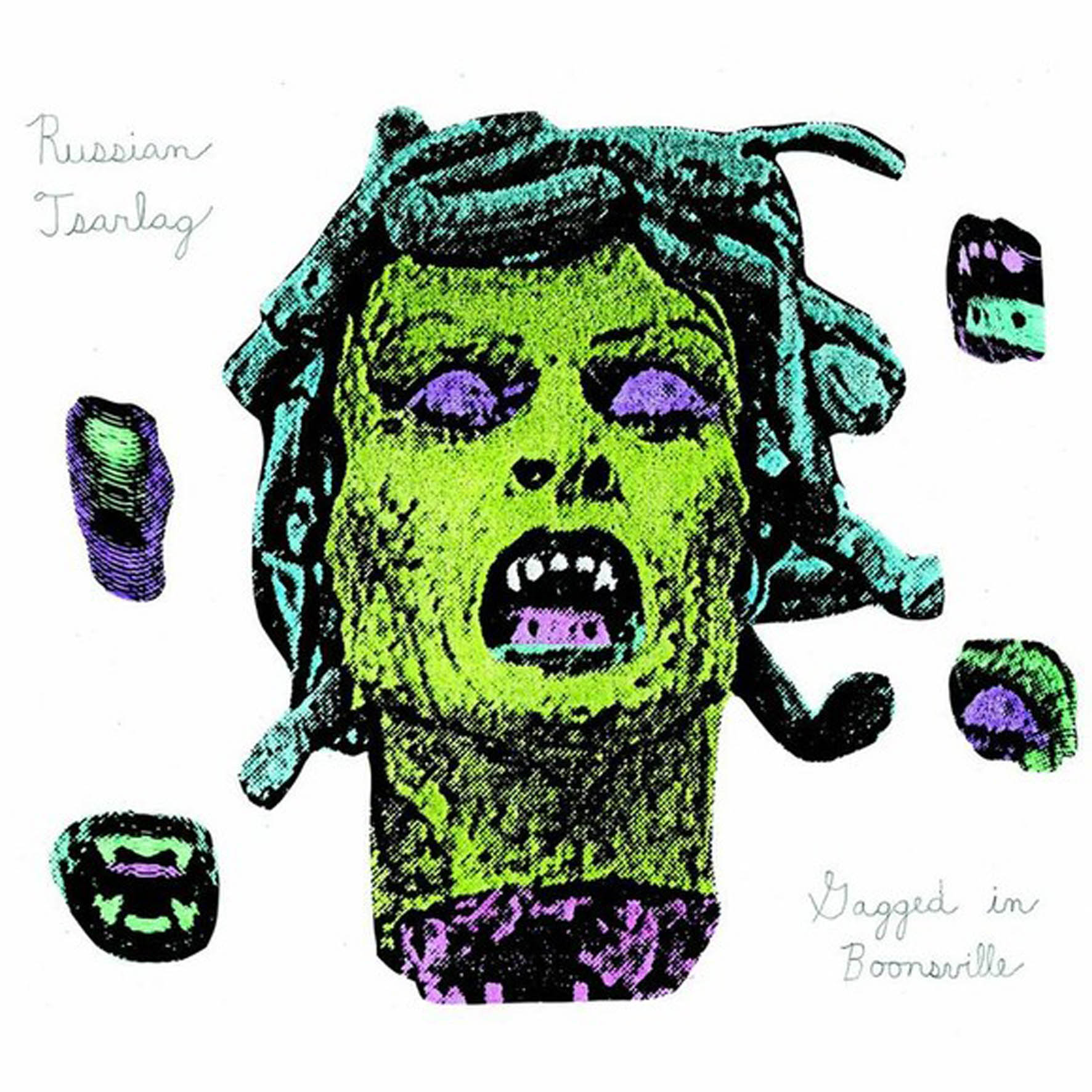 I suspect Not Not Fun deliberately release one album every year that I would absolutely love, hoping that I will miss it in order to punish me for not paying more attention to them.  I have no idea what 2012's masterpiece was (there almost definitely was one), but Gagged in Boonesville has now joined Peaking Lights' 936 (2011) in instantly flooring me upon first listen.  Stylistically, it most closely resembles what I would expect if Jandek and Dirty Beaches teamed up to make an indie pop album, yet it is somehow far weirder and more disturbed than even that highly improbably event could be.
I suspect Not Not Fun deliberately release one album every year that I would absolutely love, hoping that I will miss it in order to punish me for not paying more attention to them.  I have no idea what 2012's masterpiece was (there almost definitely was one), but Gagged in Boonesville has now joined Peaking Lights' 936 (2011) in instantly flooring me upon first listen.  Stylistically, it most closely resembles what I would expect if Jandek and Dirty Beaches teamed up to make an indie pop album, yet it is somehow far weirder and more disturbed than even that highly improbably event could be.
Providence, RI's Carlos Gonzalez has been recording as Russian Tsarlag since 2007, but his output has been entirely restricted to a slew of limited cassette-only releases until fairly recently.  Despite that, he has still amassed quite a devoted following due to the fact that there is literally no one else on earth making music like this: nearly every description that I have seen includes some type of newly coined hyphenated genre involving the words "sewage," "slime," or "mold-covered."
The reason for that is quite simple, as literally everything about Boonesville sounds broken, murky, haunted, and out-of-tune.  Yet despite all that, Carlos genuinely seems to trying to make melodic, hook-filled, and emotionally resonant music.  That fundamental perversity is what makes Carlos' work so wonderful: it is like someone in the most nightmarish, rat-infested dystopia imaginable set out to write a smash pop album using a broken guitar and a water-damaged tape machine before they succumbed to leprosy (or their roof collapsed...or both happened simultaneously).
Appropriately, there is some kind of over-arching theme to the album that involves a tenement building being "mentally poisoned by an ancient poster of Medusa haunting the basement," but that would not have been at all apparent to me if I had not read it (though it does partially explain the terrible, terrible cover art).  As gloomy as that sounds, only "Island of Lost Souls" truly feels like a dirge, as it consists mostly of a simple, minor key piano melody and mumbled, downcast vocals.  While it is definitely the album's weakest piece, it avoids "mere filler" status by opening with a dreamlike loop of Johnny Cash singing the line "I'll see you in my dreams," which illustrates another great thing about Gagged In Boonesville: there are a number of moments of genuine warmth and Romanticism lurking amidst all of the shadows, rot, and uneasiness.
The instrumental "Become Solid," for example, is genuinely beautiful and weirdly hopeful (despite its mutilated-answering-machine-message accompaniment), while the twangy and wistful "One Way Out" sounds like a classic Roy Orbison love song distantly emanating from a heating vent.  Such touches make it seem like album's characters are totally unaware that they are essentially living in a horror film, tenderly (naively?) clinging to their hopes and dreams despite their fundamentally doomed situation, which is kind of beautiful and heartbreaking at the same time.
Boonesville's stand-out songs are a bit more rocking though.  My favorite of the batch is easily the perverse would-be anthem "Feels So Good," which could not possibly sound more blown-out and somnambulant.  On most other albums, its tempo would be rightly described as "plodding," but in this context, its leaden pace is a pulse-quickening sign that something is actually alive amidst the ruins and is possibly having a very depressing party.  Both the title piece and "Green Woman" are great as well, approximating a hallucinatory, slowed-down, and pitch-shifted New Order.  Most of the remaining songs stick to that territory too, filtering wobbly synths, a steady drum machine beat, clean guitars, echo-y vocals, and catchy hooks through a distinctly "cough medicine overdose" aesthetic that works remarkably well.
That said, the most stunning aspect of Gagged In Boonesville (for me, anyway) is how natural it all sounds.  Aside from perhaps the stuttering, backwards weirdness that opens the closing "Plastic Door," I never get the impression that Carlos is willfully trying to make his music seem otherworldly and warped through some kind of artifice or theater: this is probably just what comes out when he attempts to write a song.  It almost feels like the work of somehow who has spent their entire life at the bottom of a well and has only encountered other humans through faintly overheard snatches of the radio, except there is somehow an infectious sense of macabre fun amidst all the filth and longing.  Obviously, something so ruined, forlorn, and grimy is unlikely to attract much attention outside of serious subterranean music obsessives, but Gonzalez is an absolute genius at whatever the hell it is that he is doing.  It is truly rare to find an artist as creepily, hermetically distinctive as he is and practically unheard of for something so ugly and so wrong to be so subversively entertaining and infectious at the same time.
 
Read More

